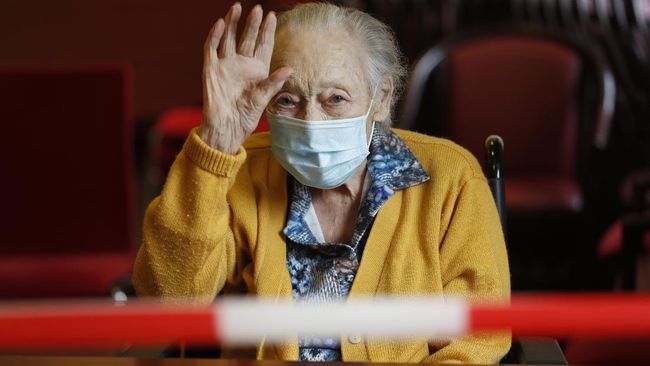Jakarta, CNN Indonesia —
The elderly (elderly) are one of the groups who are vulnerable to being exposed to Covid-19. The following are the symptoms of Covid-19 in the elderly.
Medical Staff of the Department of Internal Medicine at Cipto Mangunkusumo Hospital, dr. Soedjono said the elderly patient he was treating did not show the typical symptoms of Covid-19 during the initial examination. The average experience lay complaints such as loss of appetite.
“The symptoms we know are sore throat, fever, or shortness of breath. If the symptoms of Covid-19 in the elderly are usually only loss of appetite, it’s not typical at all when they suddenly tested positive,” explained Soedjono at the Media Center for the Covid-19 Task Force. 19 Graha BNPB, last October.
He reminded elderly caregivers to be sensitive to these changes. In fact, he said, behavioral changes accompanied by senile dementia could indicate that there is a serious illness behind it.
“They become aggressive, who used to be calm. What used to be easy to follow daily routines suddenly often refuses or doesn’t want to follow the routines they have done so far,” he said.
According to the Covid-19 Handling Committee and National Economic Recovery (KPC PEN), the following are the symptoms of Covid-19 in the elderly, in addition to general symptoms.
1. Loss of appetite suddenly
2. There is an unusual change in behavior
3. Loss of consciousness
However, each person has a different response to Covid-19.
Most people exposed to the SARS-CoV 2 virus will experience mild to moderate symptoms, and will recover without the need for hospitalization.
The most common symptoms:
– fever
– dry cough
– tired
Slightly uncommon symptoms:
– discomfort and pain
– sore throat
– diarrhea
– conjunctivitis (pink eye)
– headache
– loss of sense of taste or smell
– rash on the skin, or discoloration of the fingers or toes
Serious symptoms:
– difficulty breathing or shortness of breath
– chest pain or pressure in the chest
– loss of ability to speak or move
Seek medical help immediately if you experience serious symptoms, including symptoms of Covid-19 in the elderly, considering that the elderly tend to have congenital diseases that are more susceptible. Always contact the doctor or health facility you wish to visit before visiting.
People with mild symptoms who are otherwise healthy should self-isolate at home.
On average, symptoms will appear 5-6 days after a person is first infected with this virus, but it can also be 14 days after being infected.
When to go to the hospital when you have symptoms?
If infected with Covid-19 is proven by a positive test result, then there are two possible treatments that you will take.
Pulmonary specialist Erlina Burhan said Covid-19 patients do not need to undergo hospital treatment if they are asymptomatic or have mild symptoms.
“When should you go to the hospital if you are positive for Covid-19? When there are symptoms of shortness of breath, if there are no symptoms of shortness of breath, yes, there is no need,” Erlina said on the same occasion.
Erlina said Covid-19 patients must receive treatment at a medical facility if symptoms of shortness of breath occur. One of the signs that can be noticed include breathing in more than 24 times in one minute.
“If there is an oximeter, the measured oxygen saturation is less than 94, then you must immediately go to the hospital,” said Erlina.
Patients with symptoms of fever, dizziness, and runny nose can undergo treatment at home by giving medicines according to a doctor’s prescription. Taking a multivitamin or vitamin C supplement is also recommended.
After knowing the symptoms of Covid-19 in the elderly, see the early symptoms of Covid-19 in children here.
(bait)
– .


